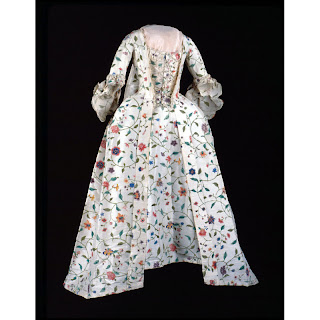I noticed in looking for period images that there seemed to be a running theme after 1771 of macaronis and love (be it courtesans or an old man after a young girl). For our purposes, the fashion still does quite well. I avoided most of the macaroni images because of their blatant exaggeration. As for the fashion itself, I found a great many fancy sheer aprons and Polonaised skirts.
The Paintress of Macaroni's, 1772
The Polite Macaroni, 1772
A Pantheon No. Rep., 1772
An Evenings Invitation, 1773
A Decoy for the Old as well as the Young, 1773
Amorous Notions at Fourscore, 1774
The Invitation, 1774
The Linley Sisters by Thomas Gainsborough, 1772
The Love Letter by Jean-Honore Fragonard, 1770
Front
Closure: Stomacher and Closed fronts equally common
Neckline: Much more rounded, with lower necklines
Skirt opening: Varies greatly, often covered by apron
Waistline: Pointed, flat, and curved
Back
Style: Both Sacque backs and English backs seen
Pleats: Narrowing across shoulders, bringing neckline in to match
Skirt Pleats: 1/2" or possibly slightly less
Shoulder Span: Corner of sleeves still distinct, but beginning to narrow and rise slightly
Sleeves
1 piece, slimmer fit, some end below elbow now. Pleats at top of shoulder.
Trim
Sleeves: Large ruffles still seen, great emphasis on the lace portion in size. Some have no fabric ruffles, just simple trim, but most likely had lace/cotton at the time.
Style: Gathered (some single line, more of a ruffle), pleated, puffed. Straight trim of 3" or less width common.
Edges: Pinked most popular
Content: Self-fabric, occasionally in contrasting color
Fabric
Solid silks and occasional stripes. A few painted silks and subtler print brocades still seen (often two-toned).
Shape
Very straight, stiff cone bodice. Skirts width often comes from pulling up the hem, although panniers would still be used. This gathering up of the skirt also pushes more fullness to the back of the gown, rather than the oval shape seen earlier. The widest point is now sitting at the low hip level.
CWF Painted Silk Gown, 1770
Met Silk Gown, 1770
Met Silk Gown, 1770-75
MFA Silk Brocade Gown, 1770
Met Cotton Print Gown, 1774
The Paintress of Macaroni's, 1772
The Polite Macaroni, 1772
A Pantheon No. Rep., 1772
An Evenings Invitation, 1773
A Decoy for the Old as well as the Young, 1773
Amorous Notions at Fourscore, 1774
The Invitation, 1774
The Linley Sisters by Thomas Gainsborough, 1772
The Love Letter by Jean-Honore Fragonard, 1770























No comments:
Post a Comment